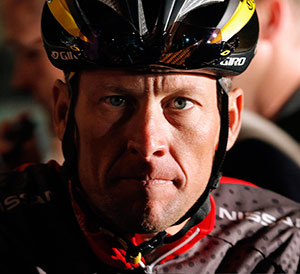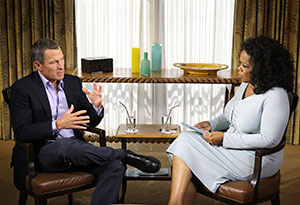VATICAN CITY — U.S. cyclist Lance Armstrong’s admission to doping is just the tip of the iceberg, since high-stakes commercial interests pressure almost every professional cyclist into the illegal practice, said a Vatican official. U.S. cyclist Lance Armstrong’s admission to doping is just the tip of the iceberg, since high-stakes commercial interests pressure almost every professional cyclist into the illegal practice, said a Vatican official. Armstrong is pictured in a 2010 file photo in South Africa. (CNS photo/Mike Hutchings, Reuters)
U.S. cyclist Lance Armstrong’s admission to doping is just the tip of the iceberg, since high-stakes commercial interests pressure almost every professional cyclist into the illegal practice, said a Vatican official. Armstrong is pictured in a 2010 file photo in South Africa. (CNS photo/Mike Hutchings, Reuters)
“It’s a world that is rotten, all of cycling, even soccer,” said Msgr. Melchor Sanchez de Toca Alameda, head of the Pontifical Council for Culture’s “Culture and Sport” section.
Pro-sports “have become a commodity that are subordinate to the free market and, therefore, to profit,” he told Catholic News Service Jan. 16.
Instead of sports being an activity that builds important values, respects human dignity and helps shape the whole human person, “it has reduced people to merchandise,” he said.
The monsignor’s comments came the same week Armstrong appeared on U.S. television to admit that he had used performance-enhancing drugs throughout his career.
Armstrong, who won the famed “Tour de France” for a record-breaking seven consecutive times, was stripped of his titles in 2012 after he was accused of using and distributing performance-enhancing drugs. He was also banned from professional cycling for life.
Though he had denied doping, Armstrong never officially appealed the United States Anti-Doping Agency’s sanctions.
Msgr. Sanchez said that some pro-athletes who have confessed to doping also revealed the enormous pressure they felt to give ever-improved performances; some said they felt it was physically impossible to fulfill such high expectations without the illicit boosts.
The practice is especially rampant in cycling, he said, adding, “it’s very sad.” Cyclist Lance Armstrong is interviewed by Oprah Winfrey in Austin, Texas, in this Jan. 14 handout photo. Armstrong’s admission to doping is just the tip of the iceberg, since high-stakes commercial interests pressure almost every professional cyclist int o the illegal practice, said a Vatican official. (CNS photo/George Burns, Harpo Studios via Reuters)
Cyclist Lance Armstrong is interviewed by Oprah Winfrey in Austin, Texas, in this Jan. 14 handout photo. Armstrong’s admission to doping is just the tip of the iceberg, since high-stakes commercial interests pressure almost every professional cyclist int o the illegal practice, said a Vatican official. (CNS photo/George Burns, Harpo Studios via Reuters)
Pope Benedict XVI recently condemned doping in sports and called on athletes, coaches and team owners to strive for victory through ethical and legal practices.
“Pressure to achieve important results must never drive (people) to take shortcuts as happens in the case of doping,” the pope said during an audience with Italian Olympic and Paralympic athletes in December 2012.
What’s at stake in the world of sports is not just a respect for the rules, but upholding the dignity of and serving the whole person, he said.
Team spirit must be channeled not only to prevent athletes from taking “these dead ends” of illegal performance-enhancement drugs or practices, the pope said, but also to “support those who recognized they’ve made a mistake, so that they can feel accepted and helped” afterward.
